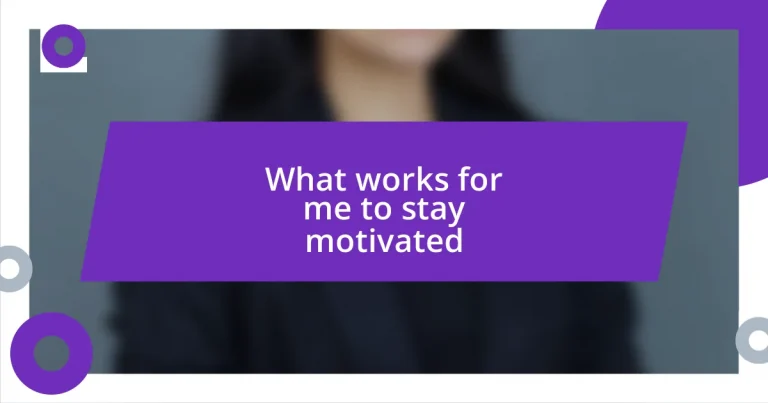Key takeaways:
- Understanding personal motivation involves recognizing the impact of emotions, personal values, and having clear goals to channel positive energy.
- Building a supportive environment through positive relationships, inspiring workspaces, and open communication is essential for maintaining motivation.
- Tracking progress and celebrating small wins can reignite motivation and help overcome setbacks by fostering resilience and accountability.
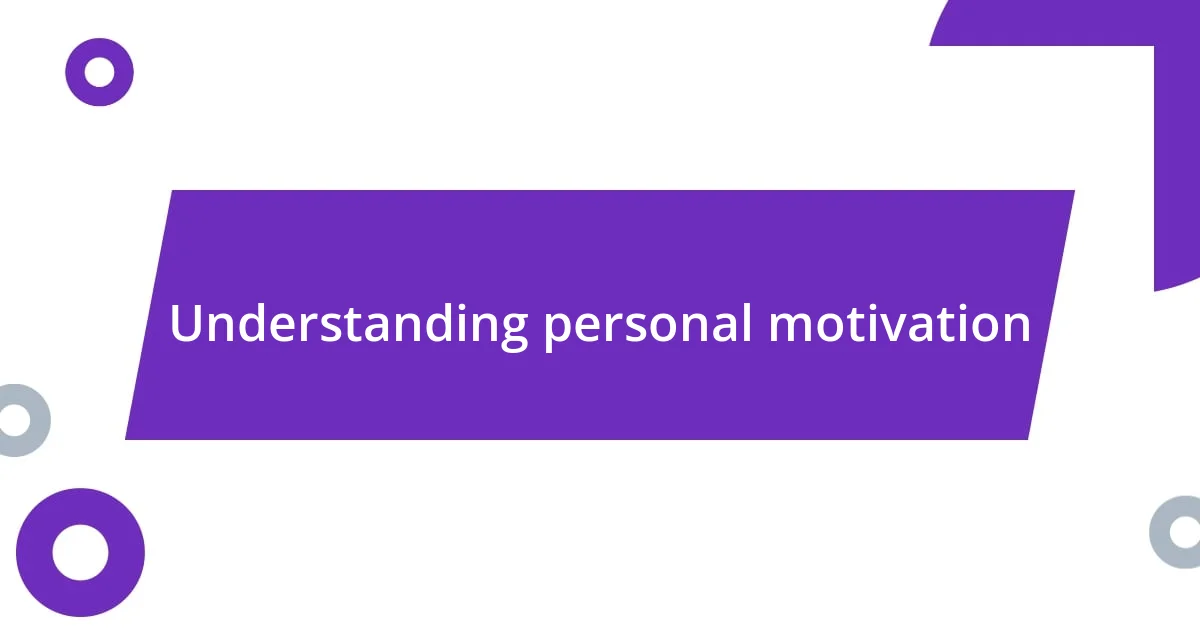
Understanding personal motivation
Understanding personal motivation is a journey unique to each individual. I often reflect on the times when I felt an unshakeable drive; those moments were fueled by clear goals and a deep sense of purpose. Have you ever experienced a surge of inspiration that pushed you to chase your dreams? I have, and it taught me that motivation blossoms from a clear vision of what I want to achieve.
For me, emotions play a critical role in this process. I recall a project that seemed daunting, yet my excitement about the potential outcome pulled me through the tough days. It was a stark reminder that our feelings can either propel us forward or hold us back. How do emotional highs and lows affect your motivation? Recognizing these patterns allows me to channel my positive emotions into productive energy and combat the waves of self-doubt.
I also find that understanding my personal values is crucial. When a task aligns with my core beliefs, my motivation skyrockets. I’ll never forget the satisfaction I felt volunteering for a cause I deeply care about. It ignited a daily drive that I rarely experience elsewhere. So, take a moment to think: what truly matters to you? That insight might just become the spark that lights your motivational fire.
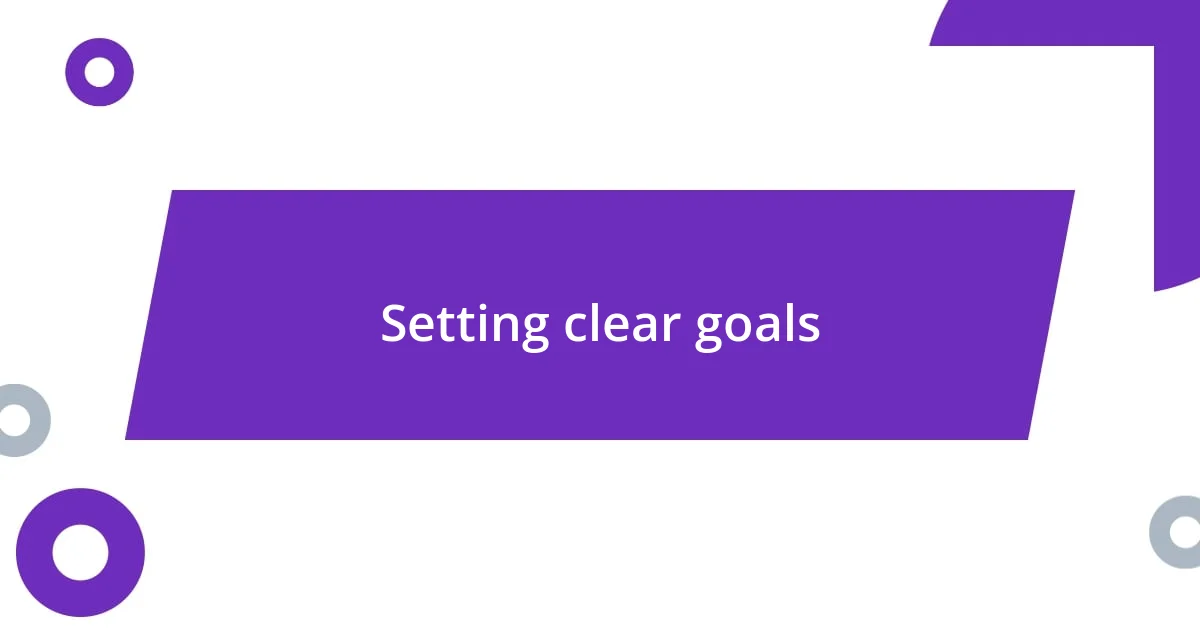
Setting clear goals
Setting clear goals provides a roadmap to motivation that I find incredibly useful. When I set specific, measurable, achievable, relevant, and time-bound (SMART) goals, it feels like placing stepping stones in a river; each step forward provides a new sense of accomplishment. I vividly remember training for my first half-marathon. My goal wasn’t just to complete it but to finish under a certain time. This clarity pushed me to stick to my training schedule, even on chilly mornings when staying in bed felt so tempting.
To help clarify your own goals, consider these tips:
- Be Specific: Define exactly what you want to achieve, like “Read one book a month” rather than “Read more.”
- Set Measurable Targets: Create quantifiable milestones, such as “Lose 5 pounds in 2 weeks” instead of just “Get fit.”
- Make It Achievable: Set goals that are challenging but realistic, so you stay motivated rather than overwhelmed.
- Relevance Matters: Ensure your goals align with your personal values and long-term vision, which fuels your commitment.
- Time-Bound Deadlines: Establish a timeline to create urgency, such as “Complete my online course by the end of the month.”
Every time I follow this structure, I notice a significant boost in my motivation and focus. I can truly connect with my ambitions, transforming them from vague aspirations into concrete plans. What about you? How can you shape your goals to propel you toward success?
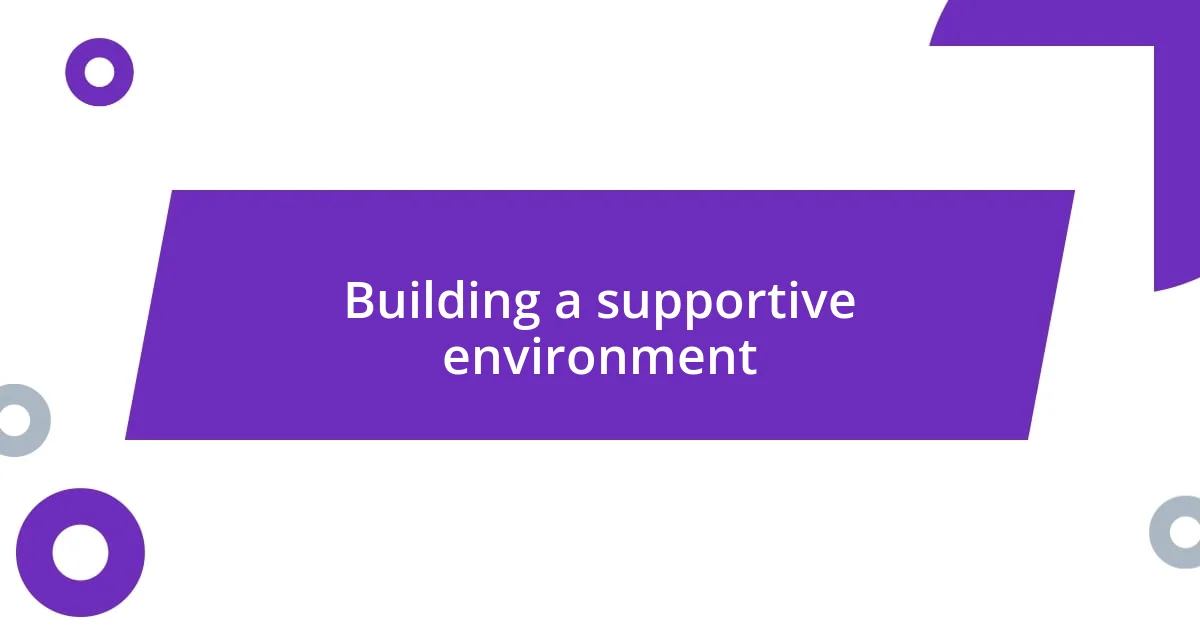
Building a supportive environment
Building a supportive environment is a game changer when it comes to staying motivated. I remember moving to a new city and feeling quite overwhelmed initially. It was only when I started surrounding myself with positive, like-minded individuals that my outlook began to shift. I often think about how vital our social circles are; they can either uplift our spirits or drain our energy. Have you ever felt buoyed by someone else’s enthusiasm? I certainly have, and that’s why I consciously nurture relationships that inspire growth.
Creating a space that encourages motivation extends beyond just people; it also involves physical surroundings. I once transformed a corner of my apartment into a cozy workspace, complete with plants and motivational quotes. That little oasis became my sanctuary. I noticed a clear impact on my focus and productivity levels. When your environment reflects your goals, it subtly reminds you of what you’re pursuing every single day. It makes me wonder, have you ever paid attention to how your workspace affects your mood and motivation?
Lastly, I believe in open communication about aspirations. Sharing my goals with friends creates a support system that holds me accountable. When I confessed to my roommate about my desire to write a book, she began asking about it regularly, cheering me on during moments of doubt. I’ve come to appreciate how having someone who genuinely believes in you can push you to take action. What about you? Do you have someone in your life who motivates and supports your dreams?
| Support System | Impact on Motivation |
|---|---|
| Positive Relationships | Uplifts and energizes |
| Inspiring Workspaces | Enhances focus and productivity |
| Open Communication | Creates accountability and encouragement |
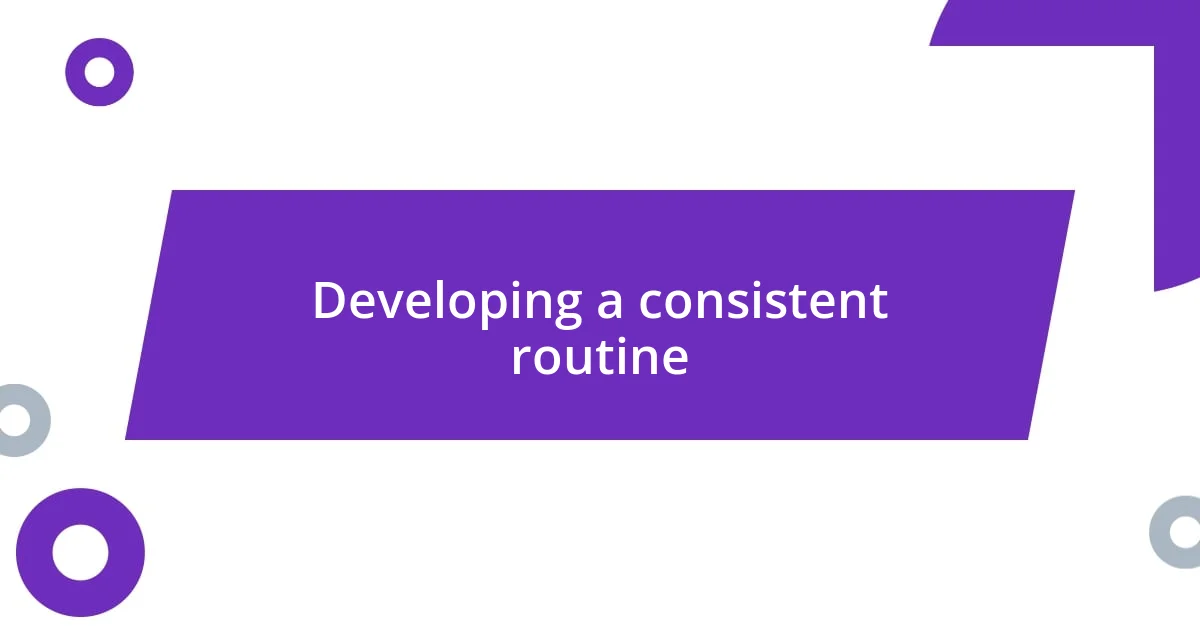
Developing a consistent routine
Developing a consistent routine has been one of the cornerstones of my motivation. I’ve found that having specific times for tasks helps me establish a rhythm that my mind and body can rely on. For instance, when I adopted a morning routine that included stretching, journaling, and a healthy breakfast, I noticed how energized and focused I felt throughout the day. It’s almost like setting the stage for a performance—if everything is in place, it just works better.
Another aspect I’ve discovered is the importance of flexibility within my routine. While consistency is key, I also allow space for spontaneity. On days when I feel particularly uninspired, I switch things up; whether it’s taking my work to a café or trying out a new exercise, changing my environment helps rejuvenate my drive. Think about it—when was the last time you broke free from the monotonous cycle of your routine? I find that these small shifts can reignite my passion and keep things fresh.
Finally, tracking my routine has proven invaluable. I often jot down what works for me and what doesn’t, and I love reflecting on my progress. There’s something incredibly satisfying about checking off completed tasks. A simple app or even a handwritten journal can make a significant difference. Have you ever looked back at your accomplishments and felt a rush of pride? I encourage you to track your journey; it’s a reminder of how far you’ve come and serves as fuel for the path ahead.
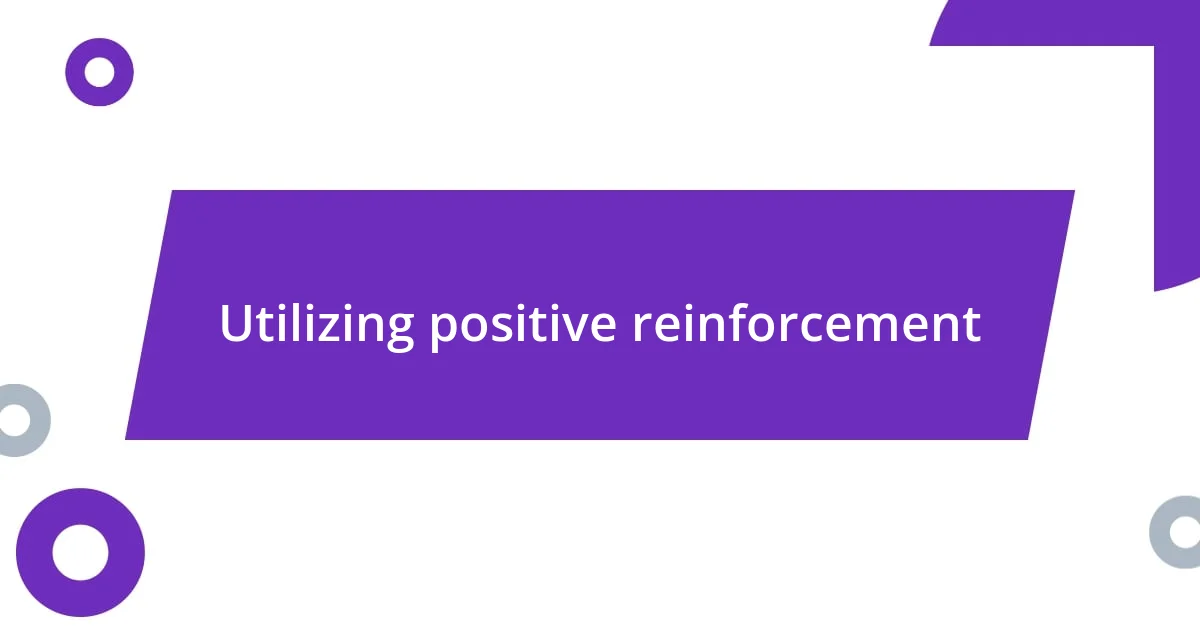
Utilizing positive reinforcement
Utilizing positive reinforcement has played a crucial role in my journey toward sustained motivation. I vividly remember the time I completed my first major project after weeks of hard work; to celebrate, I treated myself to my favorite meal and a movie. That small act of kindness towards myself felt monumental, creating a sense of accomplishment that fueled my desire to tackle new challenges. Have you ever rewarded yourself for a job well done? I find these moments to be profound motivators.
Incorporating positive reinforcement into my daily life, I developed a habit of giving myself little boosts. I used to post sticky notes with affirmations on my bathroom mirror, reminding myself of my strengths and achievements each morning. It might sound simple, but seeing those words jolted my confidence and set a positive tone for the day. Have you tried something similar? I bet you’d be surprised at how a few encouraging words can shift your mindset and improve your outlook!
Additionally, I’ve discovered the power of verbal praise from and to others. When a colleague applauded my efforts during a team project, it felt incredibly validating. It reminded me that my contributions mattered. I’ve made it a practice to uplift others as well, often providing them with sincere compliments for their hard work. This kind of exchange not only strengthens relationships but also cultivates a positive atmosphere where everyone thrives. What if we all took a moment each day to recognize someone’s effort? Just think about how that could transform our environments into spaces brimming with encouragement and vitality.
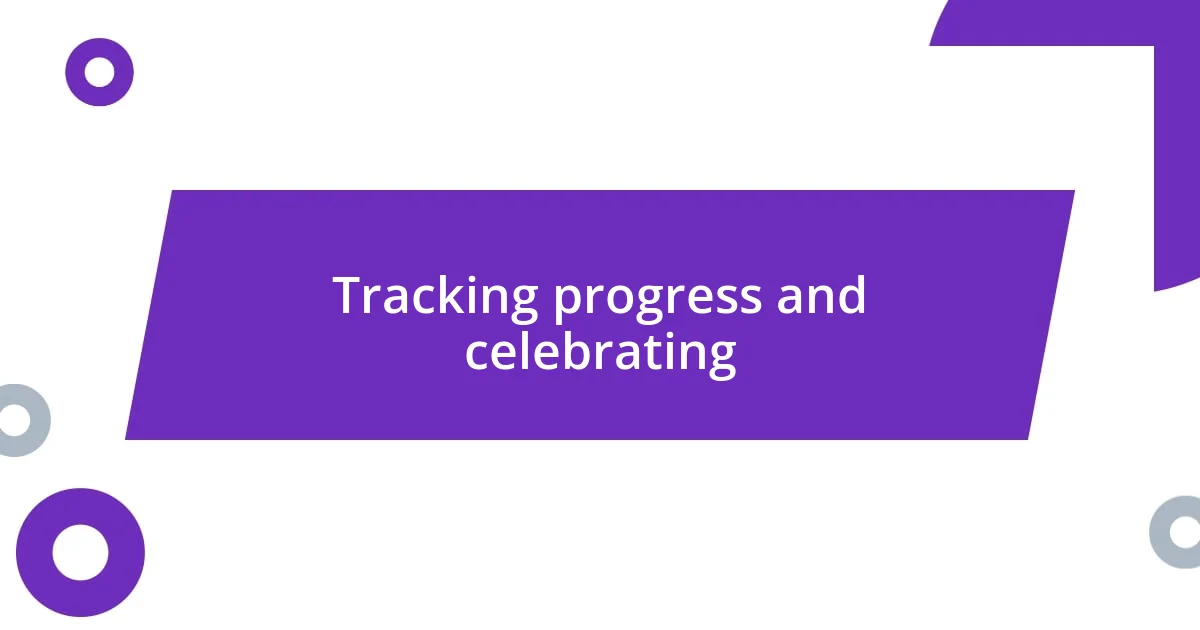
Tracking progress and celebrating
Tracking progress has become one of my favorite ways to stay connected to my goals. I often use a visual chart to mark milestones—seeing that steady upward trend fills me with a sense of accomplishment. Do you remember those moments when progress felt tangible? When I completed a challenging project, simply coloring in a box on my chart made me feel like I was crossing a finish line. It’s amazing how a little visual representation can reignite your motivation.
Celebrating small wins is another practice I cherish. I can recall a time when I successfully finished a week of workouts as planned. Instead of waiting to reward myself at the end of a larger goal, I decided to treat myself to a delightful evening — takeout from my favorite restaurant. It felt so rewarding! Every single time I allow myself to enjoy these little celebrations, I find that it fuels my drive to keep pushing forward. Have you thought about what small wins you might celebrate today?
Moreover, how I celebrate is often tied to what feels meaningful to me at the moment. After completing a significant milestone—like reaching my reading goal for the month—I might indulge in a new book I’ve been eyeing. In those blissful moments of enjoyment, I feel a surge of creativity and enthusiasm, ready to dive into the next challenge. What would you choose to do to honor your progress? I’ve learned that being intentional about these celebrations can turn a mundane routine into an exciting journey.
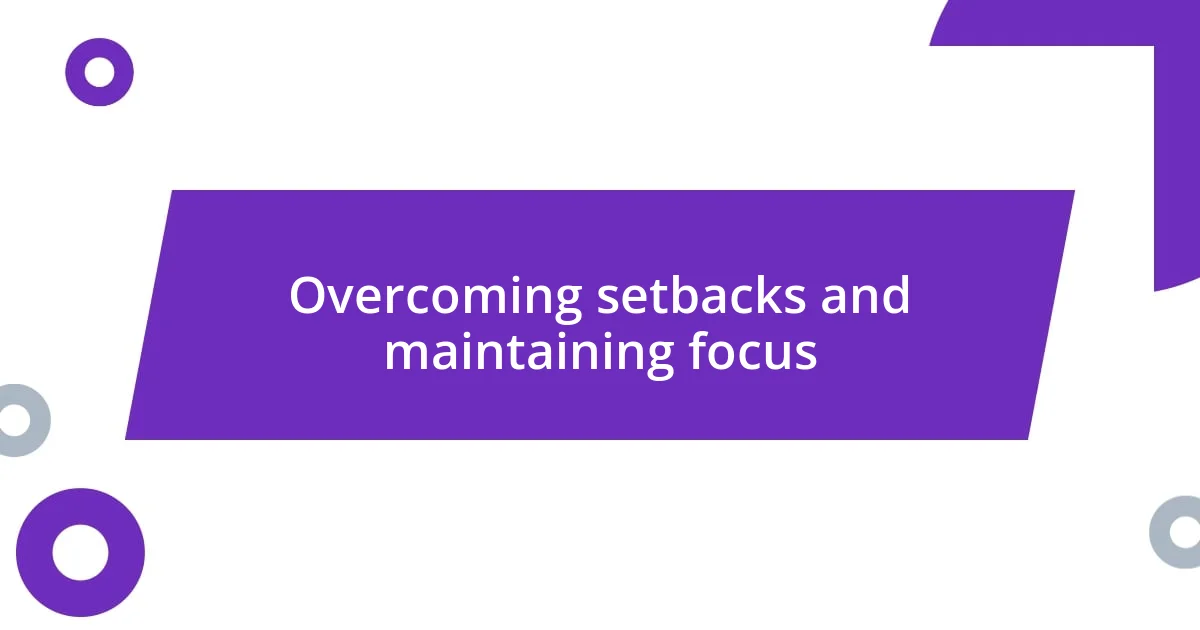
Overcoming setbacks and maintaining focus
Sometimes, setbacks hit hard, leaving us feeling disheartened and unfocused. I remember a time when I failed to meet a crucial deadline on a project I had poured my heart into. Initially, it felt like a crushing blow, but I realized that this wasn’t the end; rather, it was a lesson in resilience. Reflecting on what went wrong helped me identify areas for improvement, which ultimately became a powerful motivator to stay focused on my growth.
Staying focused after a setback isn’t always easy, but I’ve found that creating a routine helps me regain my footing. After my project mishap, I established a daily ritual that began with meditation, setting my intentions for the day. This practice became my mental reset button, reminding me that every day presents an opportunity for progress. Have you ever tried incorporating routines into your recovery process? You might find that structure acts like a comforting anchor during turbulent times.
I’ve also learned that sharing my experiences with others can be incredibly healing. I once opened up to a friend about my setback, and our conversation turned into a brainstorming session about strategies to tackle similar challenges in the future. That connection not only alleviated my burden but also reignited my motivation. Engaging with others can transform our setbacks into valuable insights—what if we all reached out when we needed a boost? The collaborative spirit can really light the path forward and keep us focused on our goals amidst the chaos.












